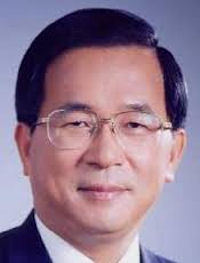Chen Shui-bian
 In a three-way contest in March 2000, DPP candidate Chen Shui-bian became the first opposition party candidate to win the presidency. His victory resulted in the first-ever transition of the presidency from one political party to another, validating Taiwan's democratic political system.
In a three-way contest in March 2000, DPP candidate Chen Shui-bian became the first opposition party candidate to win the presidency. His victory resulted in the first-ever transition of the presidency from one political party to another, validating Taiwan's democratic political system.
The narrow victory suggested voters were gradually warming to Mr. Chen's vision of a Taiwan with its own national identity - a rebuke to the Beijing government's threats of war if the island attempts to declare independence from mainland China. The DPP has long advocated declaring independence, although Mr. Chen distanced himself from that position before the 2000 election.
Chen, commonly called Ah-Bian, campaigned as a "Son of Taiwan" - a slogan that emphasized both his youth and his origins as a native-born Taiwanese. He presented himself as a fresh start after decades of KMT rule, which the DPP said was corrupt and too conciliatory to Beijing.
President Chen was re-elected by 50.1% of the popular vote to a second term in a very tight contest on March 20, 2004. The election was marred by a shooting incident the day before the election during which President Chen and his running mate Vice President Annette Lu were slightly wounded. Both of Taiwan's main political parties suspended campaign activity, following a failed assassination attempt. The election was held as scheduled. While the opposition contested the results, it was the first time that the DPP had won an outright majority in an island-wide election.
The March 2004 election also included two "defensive referenda." Historically, referenda have been closely tied to the question of Taiwan independence, and thus a highly sensitive issue in cross-Strait relations. Both referenda in 2004 failed to meet the required participation threshold of 50% of eligible voters, as did four more referenda held in conjunction with the 2008 legislative and presidential elections. The 2008 DPP referendum on joining the UN under the name Taiwan was especially controversial.
The final National Assembly passed a set of constitutional amendments in June 2005 that halved the number of LY seats from 225 to 113 and created single-member legislative election districts beginning with the January 2008 legislative election. The constitutional revisions also abolished the National Assembly and provided for the public to confirm or reject future constitutional amendments passed by the Legislative Yuan. President Chen's controversial efforts to promote a second round of constitutional revisions focused on changing the government structure were unsuccessful. The P.R.C. accused him of using the constitution issue to move Taiwan toward independence. While not entirely ruling out future constitutional changes, President Ma has stressed the need to implement rather than revise the constitution.
In the December 2004 legislative elections, the ruling DPP won a plurality with 89 of the 225 seats, gaining 2 seats more than it did in 2001, but the opposition KMT and its Pan-Blue allies continued to hold a narrow majority in the Legislative Yuan. The ruling DPP's inability to form a majority coalition led to gridlock in the LY until 2008. Following a landslide victory in December 2005 local elections, the KMT won the 2006 mayoral election in Taipei City, while the DPP won in Kaohsiung City.
In the January 2008 elections for the downsized 113-seat LY, the KMT won 81 seats and KMT allies won a further five seats, giving them a three-quarters majority over the DPP, which won just 27 seats. The DPP subsequently won several by-elections, and by April 2010 it had added six more seats, enough to prevent the ruling KMT from acting on its own to send proposed constitutional amendments to a referendum vote. As of June 2011, the KMT held 72 seats, the DPP 33 seats, the NSU 3 seats, and there were two independents.
When in office from 2000 to 2008, Chen made a name for distancing self-ruled Taiwan from China, which claims the island as its own. Beijing fumed because Chen would not agree that that China and Taiwan belong to the same country and he advocated for drafting a new constitution that was widely believed would advance Taiwan's independence. The standoff made most dialogue impossible and prompted military threats from China.
Chen also irked the United States, which wanted stronger China-Taiwan relations. Washington eventually restricted Chen's transit on US soil when he was flying from Taiwan to diplomatic allies in Latin America.
In 2009, a court convicted Chen of graft-related charges involving $20 million, making him Taiwan's first ex-president to serve time for crimes in office. His wife and two other family members were also convicted. Chen disputed all charges, calling them part of a political plot.
Chen Shui-bian left prison 05 January 2015 on medical parole after several years due to declining health. He was six years into a 20-year sentence for bribery, money laundering and other corruption-related charges. The ex-president's condition had developed to a where he lacked dignity.
|
NEWSLETTER
|
| Join the GlobalSecurity.org mailing list |
|
|
|

